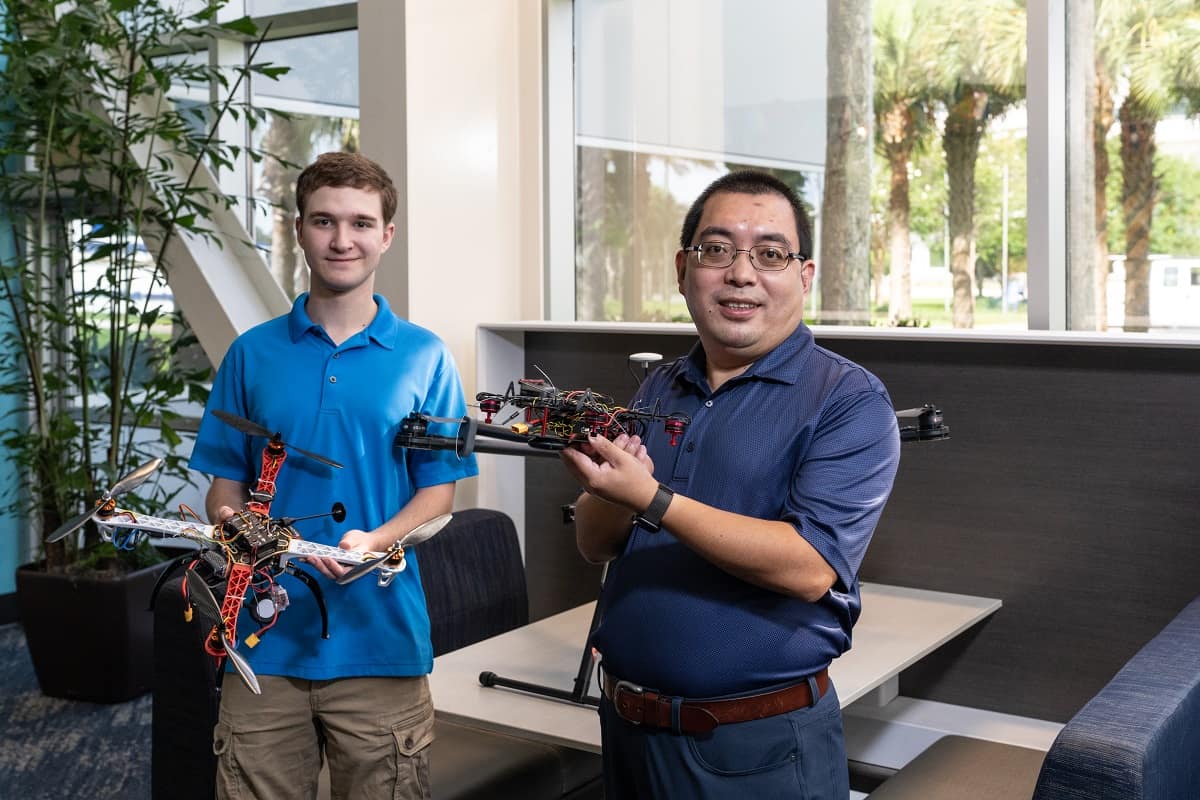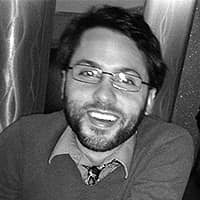Undergrads to Push Drone Swarm Research Forward with Aid from Federal Funding

Twenty-four United States undergraduate students will soon have the chance to participate in National Science Foundation (NSF)-funded research on the networking capabilities that enable groups of uncrewed aerial systems (UAS), or drones, to operate in “swarms,” led by Dr. Houbing Song, associate professor of Electrical Engineering and Computer Science.
Director of Embry-Riddle’s Security and Optimization for Networked Globe Laboratory (SONG Lab), Song, who also recently won the university’s 2021-2022 College of Engineering Outstanding Research Award, was awarded a $322,886 NSF grant to further his research in this area, specifically focusing on artificial intelligence (AI) and machine learning, over a three-year period.
The first two students selected to participate in the research are Embry-Riddle Software Engineering junior Luke Newcomb and Laurel Celeste Dodson, a Computer Engineering senior. Newcomb, who describes “everything” about drones — from their hardware to the chips that power them to the software and algorithms that make them work — as in his “wheelhouse” is looking forward to getting started on the project.
“I’m interested in almost every aspect of them,” said the Merritt Island, Florida, native. “Drones can go almost anywhere and do almost anything, which makes them so versatile.”
That versatility, he added, is what makes researching UAS so valuable.
“Drones will have a place in our future,” he said. “The technology keeps growing past what we ever knew was possible or could ever dream of.”
Research activities will focus on three core areas — network management, network design and AI/machine learning — and students will conduct field tests to validate and apply new protocols.
“The students’ participation will generate preliminary results that will lay a foundation for developing next-generation drone swarm systems and applications, which will differ drastically from networking requirements for current systems and applications,” Song said. “My ultimate goal is to tap into a diverse student talent pool and broaden participation in science and engineering, particularly as it pertains to integrating AI/machine learning into drones.”
Already, Song has licensed two patents for UAS detection and negation, and published several papers on the topic — including one on counter-intelligence measures that was cited by an arm of the Department of Defense and another that won the Best Paper Award at the 2019 Integrated Communications, Navigation and Surveillance Conference. He has also mentored three Embry-Riddle Ph.D. students, all of whom have gone on to tenure-track faculty positions at other U.S. academic institutions.
Song has also been instrumental in developing Embry-Riddle’s one-of-a-kind drone-cybersecurity curriculum, and counter-drone technology he developed is currently being commercialized. In addition, together with Dr. Yongxin Liu, a tenure-track assistant professor of Mathematics, he discovered and proved mathematically the role of rotating memories in enabling AI.
“Students who participate in this project will be more likely to continue their interest and involvement in research, either in pursuing advanced study or choosing a career relevant to drone swarms,” Song added. “Shortage of talent is a major concern for the budding drone industry, so this project will give participants a key advantage in their career searches.”
Serving as co-principal investigator on the project is Dr. Richard Stansbury, associate professor of Computer Engineering and Computer Science. Other mentors include Dr. Thomas Yang and Juan Granizo Martinez, both from the College of Engineering, and Dr. Sirani Perera from the College of Arts and Sciences.
Students currently enrolled in a U.S. program leading to an associate’s or bachelor’s degree are eligible to apply for participation in the study. Students interested in participating in the NSF-funded drone swarm research can apply online.

 Mike Cavaliere
Mike Cavaliere